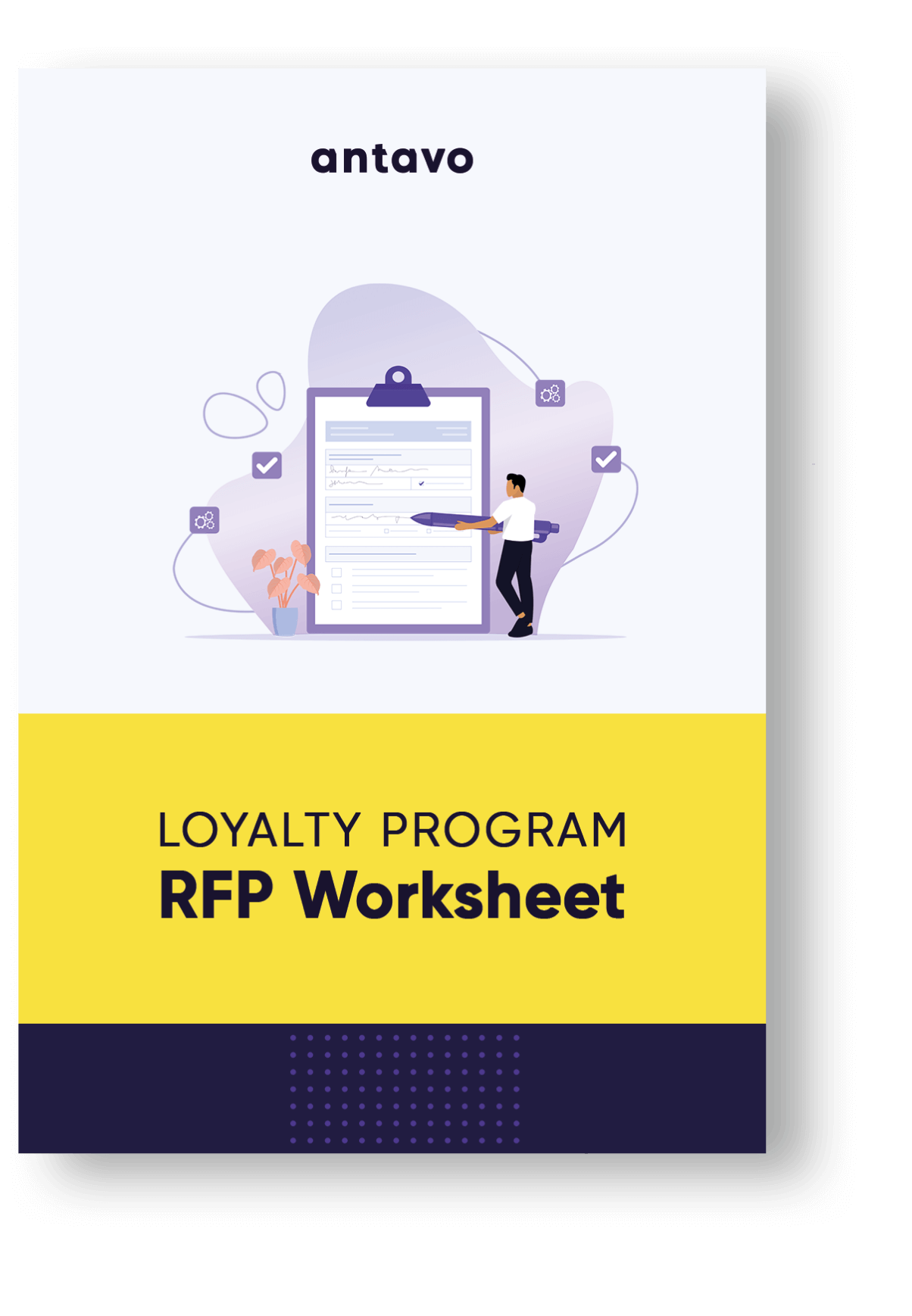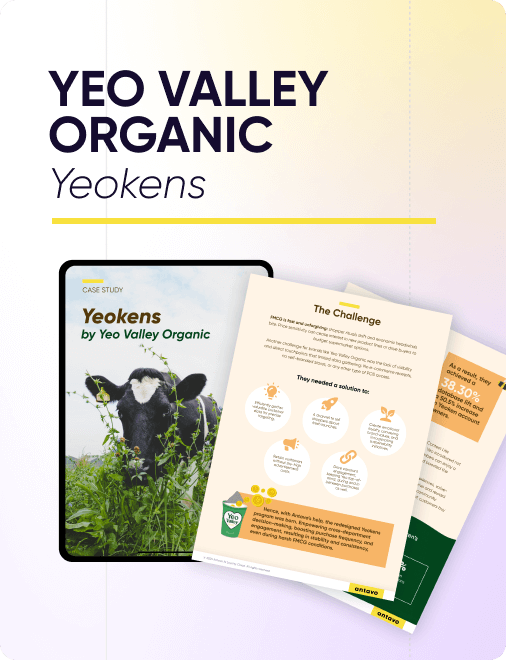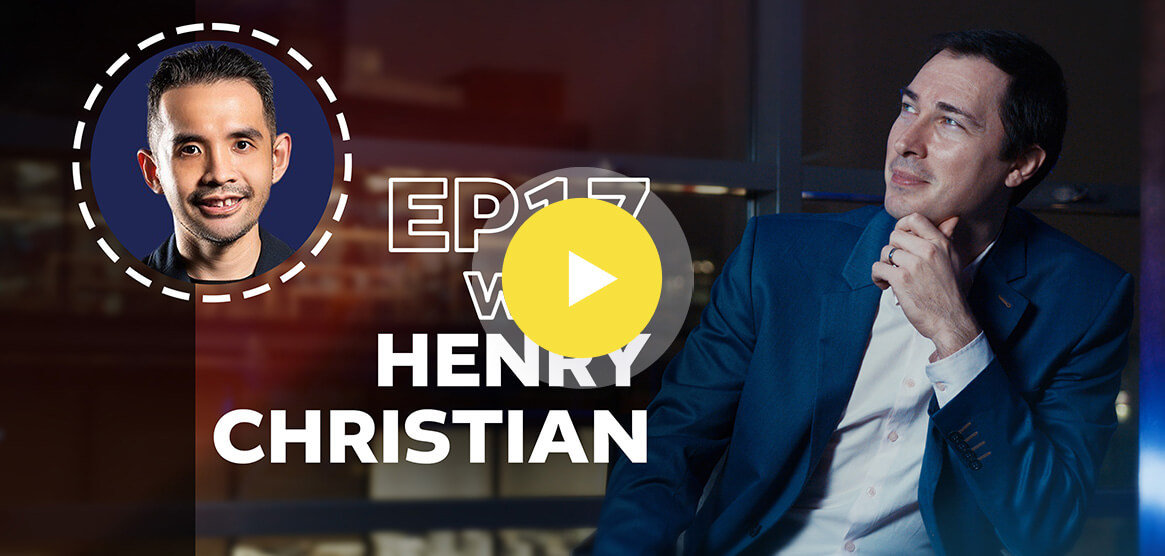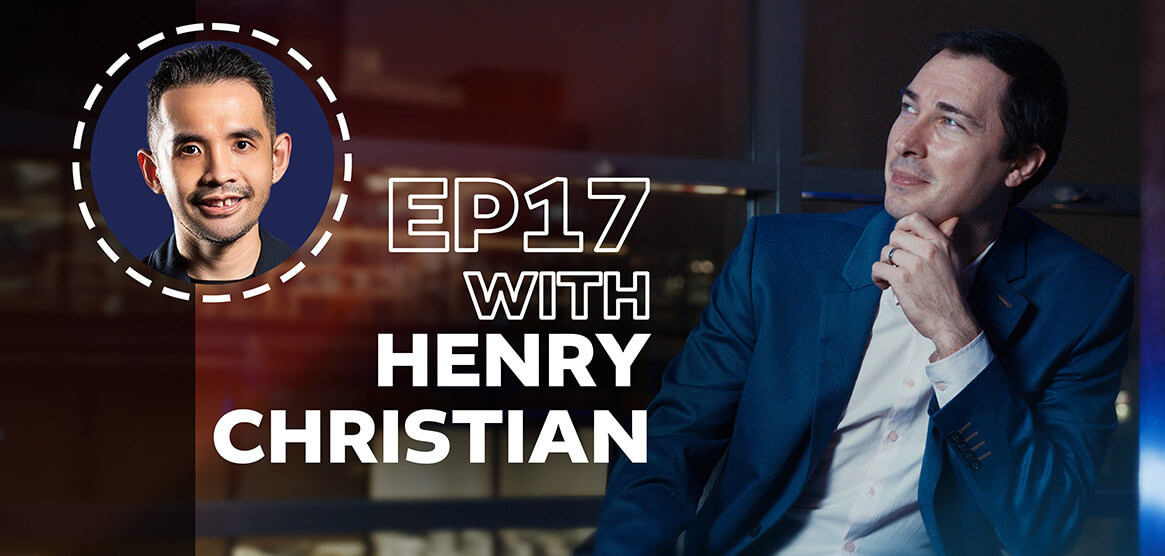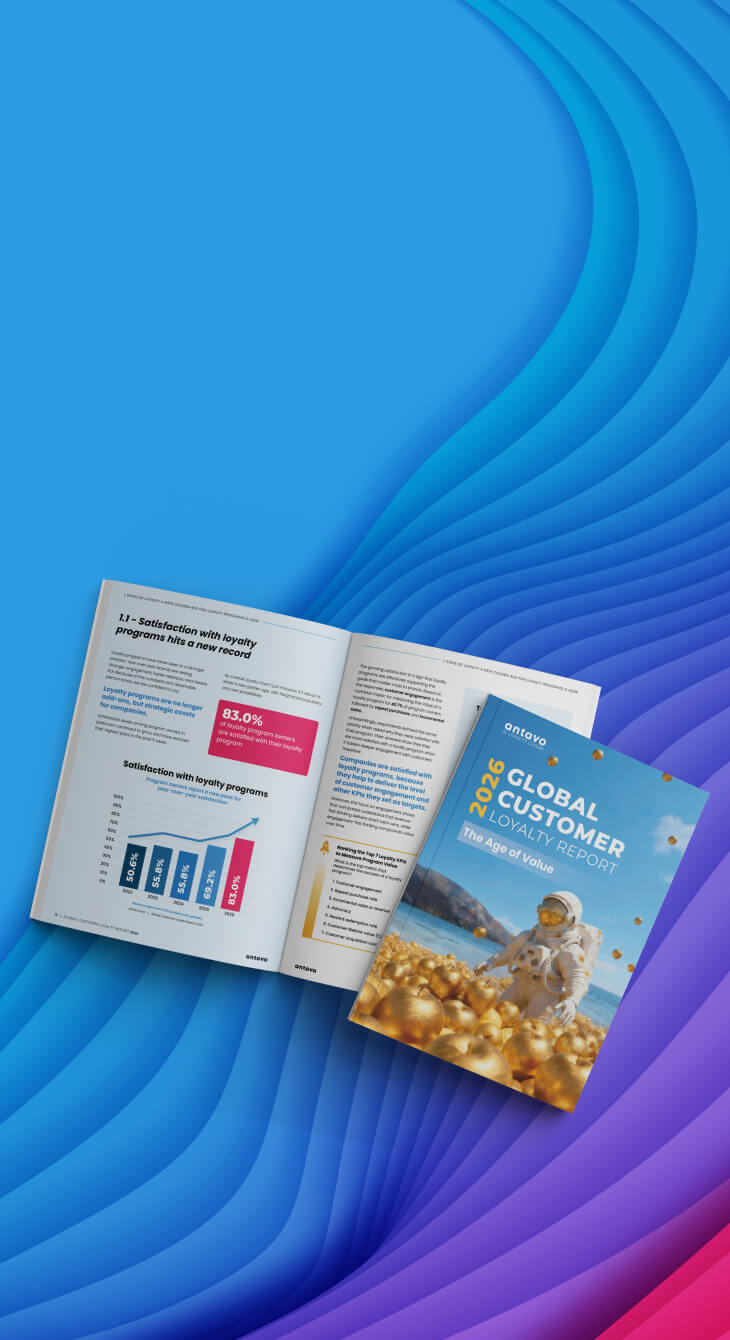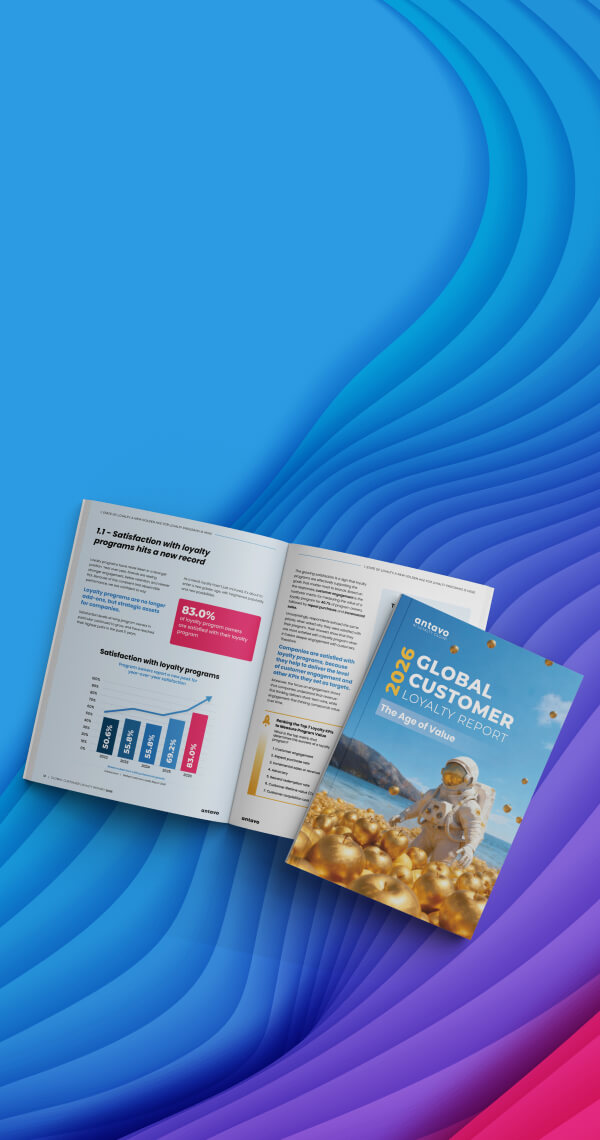On the seventeenth episode of the Loyalty Stories podcast, we are joined by Henry Christian, Principal & Advisor at HC Loyalty Advisory.
The interview for this podcast has been a valuable source for Antavo’s Global Customer Loyalty Report 2024. Make sure to download it for over 30 statistics on loyalty program trends.
During today’s session, we deep dive into why – in Henry’s opinion – every brand should look at the exemplary system of Duolingo when it comes to building long-lasting loyalty. He also explains why loyalty has a very human factor to it, and what is, what we might consider “The Trinity” of the loyalty ecosystem, and how one might achieve harmony.
Highlights from our conversation with Henry:
- What is the latest and greatest realization when it comes to loyalty programs
- The sunny side of loyalty programs getting devalued
- The rise of “programless” loyalty programs
- Questions, that every program operator should ask themselves
Learn more:
- LinkedIn profile of Henry Christian
- HC Loyalty Advisory website
- Read more about The Secret to Calculating Loyalty Program ROI
- Book a demo with Antavo’s loyalty experts
Gabor
Hi and welcome to Loyalty Stories, that is Antavo’s podcast on customer loyalty and loyalty programs. I am Gabor Vigh, one of the Partnership Managers at Antavo, and Antavo is a technology vendor that empowers loyalty programs all around the world. We help various great businesses, such as KFC, Benefit Cosmetics, and very well known global automotive and fashion brands, airports and so on.
In this Loyalty Stories podcast, we dive into the trends around loyalty programs and customer loyalty. We talk with industry experts around the world to pick their brains to learn what’s new and what’s next for loyalty programs.
Today’s guest is specialized in B2C loyalty programs for e-commerce, retail, lifestyle, and financial services industries. And he has designed, built, and operated award-winning loyalty schemes. He recently made a big decision and relocated from Singapore to Germany, which makes me even more glad that we can talk today despite this major change in life.
So please welcome Henry Christian. Hi Henry, how are you?
Henry
I’m good. Thanks for having me.
Gabor
Thank you very much for accepting our invitation and being here with us today. I am really looking forward discussing loyalty with you today, but before we just jump in and take a deep dive, would you mind just briefly introduce yourself to our audience?
Henry
Okay, so beyond then what you have just shared. So I’ve done loyalty, I think my whole experience, my whole professional experience has always been loyalty. I’ve had the privilege of running the largest coalition’s loyalty programs in Singapore as well as in Indonesia, which is the largest nation in Southeast Asia.
I’ve had the experience to be involved in running marketing campaigns, P&L management, building products that customers love. So I’ve done the whole 360s of loyalty in Southeast Asia. And recently, I moved to Düsseldorf, Germany, accompanying my wife. And we’ve decided to start a new chapter of our life here.
Gabor
Great, thank you Henry. As a warming up question, because you have been in the industry for so long, what would you say, what is your favourite loyalty program and why?
Henry
This is always a tricky one, right? If I say a program that is a competitor of my clients, they’ll be unhappy about it. But then if I say something of a program that I’ve managed, people think that I’m just promoting my brand. But let me redefine your question. If you would allow me to redefine your questions, right?
Gabor
Absolutely.
Henry
I don’t really like, when we talk about loyalty and it is always associated with a program, right? I’d like to deconstruct that and try to rephrase your questions and I ask myself, what am I loyal to? Program or no program, right? What is, and so if I were to define loyalty as, you know, I’m using the product, the services, the brands frequently, I’m always coming back to that in the presence of other, other competitions, I will always go back to that particular brand that I would say I am loyal to that brand. I am loyal to that services product, whether or not there is a program, right? Whether or not I’m getting points.
So we just spoke about it. I just moved to Germany. Obviously, one of the first few things that I had to do is to learn the language. Yeah. And where do I learn the language before coming here?
I learned, I started learning German language on Duolingo, the app. Yeah. And I think it’s a fantastic app until today. And I go to proper school right now, language school, but I still go back to my app. Every morning I will fire it up. I’ll play some and I will train myself.
So I asked myself, why am I still loyal to the app? Right. And because I’m, I’m actually going to school, a proper school, where there’s teachers, I have classmates, I have books, I have curriculums, but I still go back to Duolingo stuff, right? I say like, why do I do it?
Well, I think a few things that I think brands can actually get inspired from Duolingo in creating loyalty and creating frequent usage from the customers. I think the first is that I think Duolingo makes a really great use of gamifications, yeah, in encouraging users to commit upfront.
And they use like tokens and then you badges, right? And I always want to earn the new badge every month and therefore I will always go in and that’s really great, right? They create, they use like competitions where they were grouped. I get grouped into students of similar profiles, right? And we’ll try to beat one another, how many new words I’ve learned, how many errors I’ve made. And it’s really fantastic.
And if you think about loyalty program, if you think about brands, can they actually go deeper understanding their customers, what really actually motivates their customers and try to group them together, borrowing the concept of Duolingo, that in itself will be very powerful because they don’t have to spend on discounts, they don’t have to give it up on points or.
All they need to do is just figure out what really motivates customers to interact with the brands and then facilitate that on the app. I would say that till today, big fan of Duolingo and I always tell people that if you want to know about the concept of loyalty, the principle of loyalty, program or no program, look at Duolingo.
Gabor
Great example. I think we should be following each other there because actually I am learning German on Duolingo and someone in the previous podcast interviews brought up Duolingo as well. So sorry from the audience if I’m repeating myself, but I do have nearly 1200 days streak.
So that’s something makes me stick to the program because I don’t want to lose it, but also I am always up for the monthly challenge, which is their really great community building as well with the friends that we can invite each other, be in one team and complete another challenge together. And also we can share different kinds of gifts, for example, the experience boost, which gives you like double of the experience.
And as you said, fight your position and keep your position in one of the tiers where you belong to. And yes, it’s really motivating and I am doing it at night, so that in the morning, but that’s kind of the last thing I do on a day, so I just want to go on Duolingo and when I complete that I go to sleep. So great example.
Henry
Sounds like I’m speaking to a convert. Let’s start following each other. There you go, the power of community.
Gabor
Indeed, indeed, yes. And I also usually ask loyalty experts on the interview what is the best piece in their career if they look back, what is the program that they are most proud of, but as you said you might not want to answer this question in this way.
Henry
That’s okay. I mean, I’ve dodged away from one question. I should not be dodging away from a second question, right? Otherwise.
Gabor
Also, you can ask it or I can ask it in a different way. What is that piece of feature of a loyalty program or a concept in a loyalty program that you delivered and you are most proud of?
Henry
That I would love, I love that, I love that question. So I think, you know, as I spend more and more time in loyalty, I used to, like I asked myself this, like actually exactly what is loyalty, right? It’s loyalty about building, we spoke about it, it’s loyalty about building the coolest program that can, that is eligible to win some awards. Yeah, that’s nice. It’s always nice to have industry recognitions.
It’s loyalty about using the latest technology, web three, everyone’s talking about web three, virtual events, gatherings. I’m not taking a swipe on that. But what is loyalty?
I think to me, loyalty is about humans. It’s about the managing the interactions of the different humans that mix up the loyalty ecosystems. So when you talk about humans, we’re not talking about just the customers. I think that’s one big part of it. And within the customers, we spoke about the need to actually be able to understand the different segment of customers.
But then there’s also your stakeholders within the company. And this is one of my loyalty principles that I truly believe that, if there is no internal buy-in, if there is no internal alignment of what loyalty is, any loyalty initiatives that a brand will do will fail, will eventually fail, as simple as that.
So one big part of understanding the human is your stakeholders. And stakeholders, again, just like customers, what marketing wants is different from what finance wants, is different from what operations wants, is different from what merchandising wants, is different from what technology wants.
So the question is, you know loyalty can’t survive on its own without the support or the participation of the different functions in the company. So I think it’s important before a brand embarks on any of the loyalty initiatives is to define what is loyalty and what is needed from different functions to make loyalty successful. I think there is the customer, you’ve got your stakeholders.
I think the third part, of course, not just the functions, but also the employees of the brand itself. Right. Because I believe that, you know, understanding what motivates the employees to go beyond their job scope, to delight the customers, to always deliver good experience to the customers, it takes more than what is written on their job descriptions. Yeah.
And the only way for employees to be able to do that is when they feel that they are appreciated within the company. I have this saying, those who are loved best will love best. So if employees feel that they are loved and appreciated in the company, they in turn will love the end customers naturally.
So coming back to your questions, what am I most proud of is that, when I manage to actually align the needs and the wants of all these three parties, and it’s not easy, and it’s not like I do it once and that’s it, because we are talking about humans.
This week everyone’s happy, next week at the slightest sign of something going wrong, they will change their tune. So one of the features, of what makes a good loyalty program, something that I’m most proud of, is when I’m able to orchestrate and gain consensus and harmony among all the humans that make up the loyalty ecosystem.
Gabor
Great, thank you Henry. And if you look back maybe two, three years back in time, what do you consider the big changes in the loyalty space?
Henry
I think loyalty has slowly come up from its cocoon where loyalty has always been, if you look at companies across the world and then you ask at which function does loyalty sit in? I always ask to ask this question in the past during job interviews, so who am I reporting to? What is the answer? Marketing, always.
Marketing, yeah. Loyalty is part of marketing, no? It’s the extension of marketing, right?
I think what I’ve seen in the last few years is that loyalty is starting to carve out a space on its own. Like loyalty is starting to get a seat in the big boys or big girls table, right? So you see the emergence of chief loyalty officers and people talking about, yeah, loyalty is not just marketing.
Loyalty is more than marketing. So one of the biggest trends is I see that the role of loyalty moving from a cost center to a revenue center. Revenue generations, data monetizations. And I think it is helped with the, for example, I can just maybe I can quote, let’s say, Amazon, with Amazon Prime, their success stories whereby they say, well, I launched a subscription program.
This is the results. And look at it, through the power of subscription programs, this is the ROI. And then, of course, you’ve got your Walmart of the world, where through their loyalty programs, they actually built a digital ads business, which today is ranking in, I can’t remember the numbers, but if ranking is like hundreds of millions of dollars every year, and then people starting to notice that, oh, hold on.
You mean loyalty program is not just for me to send email. You mean loyalty program is not just for me to give up plastic cards to my customers. So everyone suddenly realized that the value of loyalty program. And I love it. To be honest, I love it because that’s what loyalty is. It’s supposed to drive business within the company.
First, of course, it needs to help the company do better in their customer engagement, right? But that doesn’t stop, that shouldn’t stop loyalty from being able to create ancillary revenue for the company. And I see that trend continuing in the next few years.
Gabor
Oh, that’s really good news, especially for a company like Antavo.
Henry
It’s really great news for me too. Yeah.
Gabor
And did you see anything that surprised you recently, like any program that got launched in the past two, three years that was kind of offering some unexpected or, I would say, other than normal programs?
Henry
I think what I’ve seen, what I’ve started to notice is that there has been, let’s not go far, in the last 6 to 12 months, you actually see many loyalty programs get devalued. Yeah, like major, major devaluations of airlines’ miles, points, and then you ask, like I asked myself, like, why, right? Why? Why are they devaluing all these things?
Of course, two ways to look at it. Half glass, half empty will say that, oh, everyone doesn’t believe in loyalty programs. Therefore, they are going to can it, they’re going to kill it, right? But half glass full actually tells me that everyone now is expecting an ROI from loyalty programs and that forces loyalty program operators to be more savvy, with their programs to be more savvy in running experiments, to be more savvy in communicating the impact of loyalty programs on the business.
So on one hand, while I’m surprised that there have been many program devaluations, I think last week there was one of the US airlines. It created a big hoo-ha. But at the same time, I actually see it to be good.
Like I said, everyone doesn’t think about loyalty. Everyone thinks about loyalty program. It’s like, oh, I give out points. I give out this. I give out that.
But now when people start to say that what’s the ROI, which is good, because there is no more free money in the world, then it will separate winners from losers. And I do hope that there will be more loyalty programs that will get devalued and eventually closed down, because they have not been abusing loyalty. But then, that will also set apart the good ones, and it will set apart companies who truly see and harness the value of loyalty programs.
Gabor
Great. And you mentioned the trend before. Do you see other trends that are going to dominate the loyalty market maybe in the next 12, maybe 24 months?
Henry
We spoke about community earlier. I actually see the surgeons of programless loyalty program, if that makes sense to you. I think companies will not call it loyalty program in the old traditional sense of it. But they have, a, and I don’t want to use the word community too loosely, but they have a way to actually group their customers together based on their respective goals, based on their respective needs, facilitate the interactions with one another, but still happening within the brand’s platforms itself, which will then eventually generate stickiness and loyalty back to the brand.
And I see more and more, I actually see more and more in that because people are now beginning to realize that it just doesn’t work. Right. It’s like at one point of time, everyone seems to have a loyalty program. You can’t not go into a restaurant, into a mall without signing up for a loyalty program. Right.
Now everyone starts to say, do I need loyalty program? And that’s a good thing. Yeah. And people are starting to define what is loyalty. And there will be more and more programless loyalty program. That’s what I will call it.
Second, on the same note, I actually see there will be more, it’s not coalitions, but there will be more and more partnerships and alliance between brands that comes together and realize that, hey, you’re not my enemy.
We are all still serving the same customers. Let’s come together and think of a way that we can create a win-win value provisions for both brands, but at the same time, delighting the same pool of customers that both brands actually serve. So I do see that happening.
And the last one, like what I’ve mentioned, there’ll be a loyalty program is actually expected to drive additional revenue, additional income and that’s going to be exciting.
Gabor
And what do you see, Henry, or how do you see it? How a loyalty program technology company should support all of this? How a technology company should target or ready itself for these kinds of trends? And what are those features that are more or less like must have these days?
Henry
Well, so I think I’m always a believer that technology will support the overall strategy, right? It’s never the other way around. I think number one is it’s important for a technology, a loyalty technology company like yours, to be also be versed in helping brands, sharpening their strategy, their loyalty strategy, right.
Because very often, and I’ve been guilty of that in the past as well, I’m not absolving myself from this, what I’m about to say, where in the urgency of wanting to look for technology partners, right, and then we just open an RFP, right, then what happened? And then when we start receiving questions from potential partners.
We don’t know how to answer that because we don’t know what we want. We don’t even define what is loyalty. And that’s difficult. So I think it’s important for, well, it is not your bread and butter, but I think it’s important that you are able to help the brands to first crystallize what is their strategy and define what do they want out of the technology. And I can tell you from experience. If that’s not done, even if you win the account of the brand, 12 months later, they will turn around and ask you, why am I paying you this much again? And you don’t want that happening.
So that brings me to my second point. I think you need to help the brands to see or rather to track and measure their ROI of their technology spend. And I think that would be a good feature to have.
Being clear of what is the success metrics that brands wants to see or have from the programs and enable an easy way to actually measure upleave and show ROI to the stakeholders is really, really important because at the end of the day, I can tell you that that’s all brands care about. Why am I paying you this much? Show me what is the value.
Gabor
Yeah, exactly, exactly. I can definitely understand that and I see it on the market as well that this is one of the best advice that loyalty consultants can provide to those brands who are looking to exploring or investing in loyalty. And also when it comes to technology, what would you say? Buy or build in-house?
Henry
Oh, this is, I think we need more than a podcast for this, right? Gabor? And we can debate about this. Now, let me put it this way. I’ve been on both sides of, I’ve worked for companies who are on both sides, right? Who, number one, who will say that, just buy, just buy, just buy, just buy, right? I don’t know what is needed, just buy. Everything’s out there. So there’s one extreme.
There’s another extreme. I’ve worked for a technology company where, when I talk to the engineers and I say that, can we look at that software? They look at me as if I just insulted their mother. Well, because they’re engineers, their job is to build things. I mean, nothing wrong about that. And so that’s the other extremes where, where they will say that, I just want to build everything.
I think the answer to me, as always, is somewhere in the middle. Yeah. I think it’s important for brands to first understand what is the one thing, what is your core technology that you can’t outsource to anyone? And you are really good at it, right? Because of legacy or because of knowledge, whatever, right?
So in the case, for example, like, like let’s say a department store, I’m making this up, let’s say a department store, merchandising, pricing is something that is very key to them, right? And they have their decades of knowledge built into it and probably that’s not something that they want to outsource, right? And they’re right, and maybe that’s what you should do, right?
But then for things like marketing campaigns, like loyalty, right? I always tell people, I always tell the brand, right? Loyalty features if you look at across the platforms, right? I dare say, 80 or even 90 percent of the features across loyalty platforms are me too features. It’s there. You give out points, you’re reading points, segmentations, run marketing campaigns. It’s all there.
So it’s important for brands to know what do they need these partners for and then plug in to their existing technology that they own and they don’t outsource. So coming back to your questions, buy or build, it really depends on the needs of the brands.
And if they don’t have the expertise to build, let’s say in the case we are talking about loyalty, right? Then don’t build it because they are really ready softwares out there that can be plugged in, easy or not, I don’t know, right? They can be plugged in to your existing technology.
Gabor
Great, thank you for sharing this with us, Henry. And as like a last question, is there anything else in mind that you wanted to share with the audience or give them advice or give brands an advice while looking to discover loyalty?
Henry
Yeah, ask yourself these questions. People like to ask, usually most brands, when they start, before they embark on an loyalty journey, they start by stating, what do I want to get out of loyalty? They go into the brainstorming. Oh, I want this. I want increase in sales. I want more brand love. I want customer retention.
But I urge brands to flip the question around and ask, what will you lose out, if you don’t have loyalty. And if the answer is nothing, then don’t do it. You shouldn’t do it if you don’t think there is anything you will lose out if you don’t have a customer loyalty structure. But if there are things that you know you will lose out, that’s when you start doing your cost-benefit analysis and move on from there.
So don’t just think about what you will gain, but also think about what will you lose out if you don’t do it. And it’s OK not to do loyalty if you think you can live without it. Brands just need to be clear about what they want to get and they want to do.
Gabor
Oh, brilliant. Thank you very much, Henry, for the valuable insights. And thank you very much for being here with us today and sharing your thoughts. I really enjoyed the conversation with you. And yes, we covered a lot of topics today. And I usually have one or two favorite pieces in the conversation.
I had loads, for example, when we were talking about that loyalty is more than marketing. It’s a separate business and how it should be shifting and how it is shifting from a cost-centered profit center and I was very happy to hear that from you that it’s gonna be a future trend and I had other podcasts guests here with me who were sharing the same view on this.
So really, really looking forward to the point of view around loyalty will change towards this. And also the programless loyalty programs was a great insight as well, Henry. So yeah, lovely. Thank you so much for being here with us today.
Henry
I had fun. Thank you for having me.
Gabor
Thank you, Henry. And for the viewers, wherever you listen to us, be it on a podcast platform, YouTube, or LinkedIn, please like this podcast. Also subscribe to our channel to see when the next episodes are out. But also tell us in the comment section below what you think about loyalty.
Visit also antavo.com to discover your next loyalty software, Antavo is a next-generation loyalty program technology vendor used by global companies like KFC, Benefit Cosmetics, global automotive, fashion companies, and airports all over the world.
But also don’t forget to visit Henry’s LinkedIn page to find out more exciting details of his work.
Thank you and see you on the next one. Bye for now.
